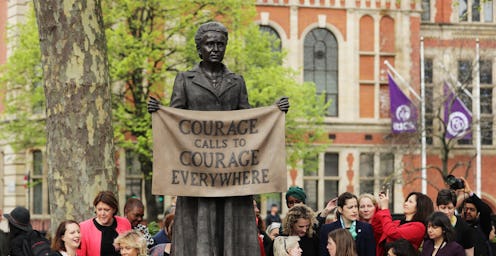News
One Of London's Main Squares Now Features A Statue Of A Woman — Alongside 11 Men

London's Parliament Square has just received a new statue — and unlike the rest of the statues gracing that venerable public space, the new statue isn't a man. Now you'll need to know who Millicent Fawcett was, as London just added her statue to one of the city's most prominent areas.
Fawcett was born in 1847, according to the BBC, and she spent much of her life campaigning to give women the right to vote. She began working toward that goal at only 19, but British women weren't granted that right on the same level as men until 1928 — only a year before Fawcett died at age 82. Biography Online wrote that as a leader of the suffragist movement, Fawcett was always a major proponent of non-violent resistance. She was the president of the National Union of Women’s Suffrage Societies from 1890 until 1919 — one year after women were able to begin voting on a limited basis.
While probably the most famous British proponent for women's right to vote was Emmeline Pankhurst, Pankhurst was much more radical and militant in her politics than Fawcett was. The two women's philosophies — Fawcett's suffragist movement committed to non-violence and Pankhurst's suffragette movement willing to resort to violence when they deemed it necessary — marked what Biography Online described as a major divide in the women's rights movement of the time.
"I cannot say I became a suffragist," Fawcett wrote, long after she had become involved in the movement, in an National Union of Women’s Suffrage Societies publication. "I always was one, from the time I was old enough to think at all about the principles of Representative Government."
The Evening Standard wrote that Fawcett was born into a fairly well-off family that supported her education and nourished an interest in politics among their children. Her sister Elizabeth Garrett Anderson also became a notable figure in feminist history as the first female doctor in the United Kingdom, according to Biography Online. Fawcett married a man who was a women's rights activist, and together the two of them worked to push Oxford University to accept women. She also co-founded Newnham College, one of Cambridge's first colleges to accept women, according to its website.
As if getting the right to vote for women weren't enough, Fawcett also worked for other humanitarian causes. A London School of Economics blog described how Fawcett went with a group of female activists to South Africa to investigate and document the deplorable treatment of Boer inhabitants of South Africa by British troops during the Second Boer War — and they then worked to end it. Biography Online then explains that she and the National Union of Women’s Suffrage Societies only supported World War I after great consideration as to whether something could be done to avoid it. Her statue is holding a sign that says, "Courage calls to courage everywhere," which was one of her more famous quotes, according to Harper's Bazaar.
London commissioned sculptor Gillian Wearing to create Fawcett's likeness, so the statue won't only be the first statue of a woman in Parliament Square — it's also the first statue created by a woman in the Square.
“Millicent Fawcett was an incredible woman and by honouring her in Parliament Square I believe she will continue to inspire generations to come,” Wearing told the Guardian.
The effort to get some female representation into Parliament Square began in 2016, when London activist Caroline Criado Perez noticed during a run through the square that she had only ran past male statues. “Why on earth? I can’t live in a world where such stupidity continues," she told the Guardian at the time. And as it happens, she'd had some experience increasing the prominence of important female figures. Previously, Criado Perez, ran a successful campaign to get Jane Austen onto the 10-pound bill.
Another figure who came out strongly behind the statue was London Mayor Sadiq Khan, who spoke at the statue's unveiling. "When you think of the great people in Parliament Square and when you realise that not one of them is a woman, it sort of begs the question, are we saying there haven’t been incredible women in the past? That our country hasn’t been built on the back of great women?" Khan said.
Now, one of Britain's great women has finally received some very public recognition for her achievements on behalf of women everywhere.